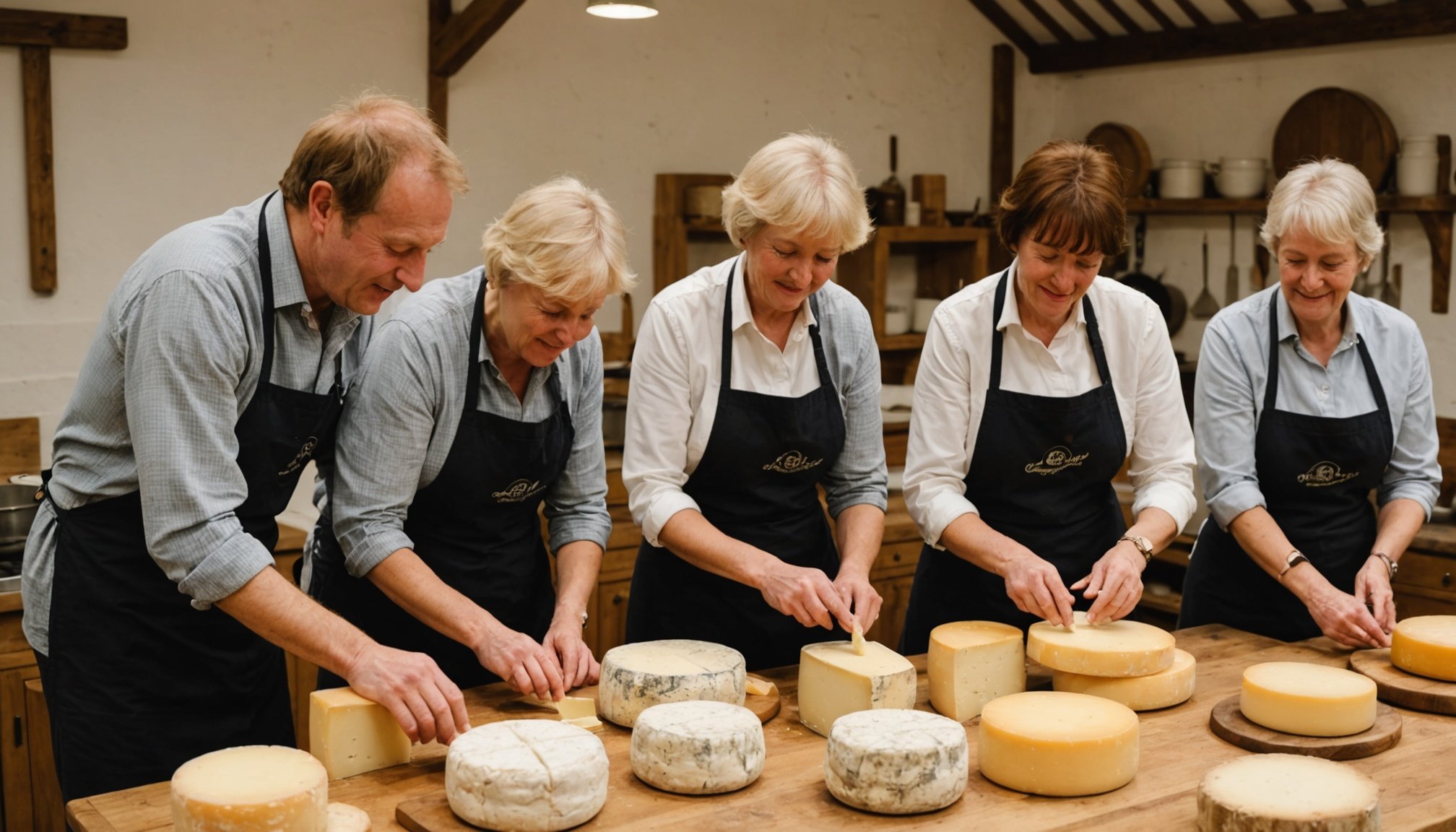Overview of Cheese-Making Workshops in the UK
Cheese-making has a rich historical significance and a deep-rooted cultural heritage in the UK, providing a backdrop for authentic cheese-making experiences that enthusiasts relish. The art of transforming milk into a variety of cheeses dates back centuries, and cheese-making workshops across the UK offer a glimpse into this traditional craft. These workshops highlight the diverse range of cheeses, each embodying the distinct regional characteristics where they are produced.
The UK’s regions are renowned for unique cheese types. From the creamy Lancashire to the crumbly Cheshire, and the robust Cheddar of Somerset, each cheese holds the identity of its origin. Workshops aim to deliver genuine cheese-making experiences by incorporating these regional techniques and traditions. This ensures that participants not only learn the process but appreciate the cultural narratives behind each cheese.
Also to discover : Discover the Rich Legacy of English Tea Traditions: Your Guide to Learning in London
Emphasizing authenticity is crucial in these workshops, as it anchors the learning experience in real, regional practices. This authenticity educates attendees on the nuanced processes involved in crafting cheese, fostering deeper appreciation and respect for the age-old tradition preserved in the United Kingdom. By attending, enthusiasts gain not only skills but also a connection to the heritage of British cheese.
Top Authentic Cheese-Making Workshops
Discovering the best cheese-making workshops in the UK is a delight for culinary enthusiasts who seek authentic experiences. These reputable workshops offer enriching hands-on sessions to hone your cheese-crafting skills.
Also read : Unveiling the Art of Traditional UK Pottery: Where to Immerse Yourself in Craftsmanship
Workshop Name 1
This workshop is a favourite among cheese aficionados, praised for its comprehensive curriculum. It guides participants through every facet of cheese-making, from selecting premium ingredients to mastering aging techniques. Attendees typically start by crafting creamy bries and tangy cheddars, gradually advancing to more complex gouda and blue cheeses.
Booking is straightforward, with spots filling up weeks in advance. Workshops are held monthly, priced at £150 per participant, which includes all materials and a take-home cheese kit.
Workshop Name 2
Renowned for its focus on traditional methods, this workshop offers a deep dive into artisanal cheese-making. Participants gain practical insight into constructing rich camemberts and robust stiltons under expert guidance.
Sessions are accessible year-round, with packages starting at £200. The fee covers the session, recipe booklets, and a guided tasting session.
Workshop Name 3
This workshop is ideal for beginners, offering a welcoming introduction to cheese-making. Students learn to make soft cheeses like ricotta and mozzarella, progressing to semi-hard varieties.
With a £120 registration fee, the workshop includes personalized instruction and a curated selection of starter cultures and molds. Sessions are available every quarter, with flexible cancellation policies.
User Reviews and Testimonials
Reading through cheese-making reviews can be a delightful and enlightening journey. Many workshop experiences bring together a diverse group of enthusiasts eager to hone their craft. Common praises include knowledgeable instructors and hands-on activities, which participants believe enrich their learning.
Community feedback plays a crucial role in choosing workshops. Positive user reviews often highlight instructors’ ability to make complex techniques understandable and enjoyable. Experiences where attendees express satisfaction with the tangible results of what they learned also underscore the workshop’s success.
On the other hand, some concerns are often mentioned in these reviews. For instance, the availability of beginner-friendly sessions can be a mixed bag. While some workshops cater well to novices, others may predominantly attract experienced cheese makers, leaving some beginners feeling overwhelmed.
When considering a workshop, it is essential to delve into these reviews to gauge what suits your level and interests best. Engaging with a community that shares honest experiences assists in making an informed decision. In conclusion, reviews offer a wealth of information and perspective, guiding prospective attendees to workshops where they can flourish.
Regional Cheese Specialties and Techniques
Exploring the diverse world of regional cheese specialties reveals the rich tapestry of flavours and traditions embedded in the UK’s cheesemaking heritage. Each area boasts unique cheese-making techniques, influenced by local ingredients and cultural practices. For instance, the Cheddar crafted in South West England is renowned for its sharpness, owing to the specific bacteria used during fermentation. Meanwhile, Stilton, a beloved blue cheese from the East Midlands, is characterized by its crumbly texture and distinctively tangy taste, achieved through careful mould management.
Techniques and Ingredients
The variance in cheese-making techniques across regions involves numerous factors, such as milk type, ageing process, and environmental conditions. In Wales, for example, Caerphilly cheese traditionally utilises cow’s milk, milked on lush pastures, enhancing its mild and creamy profile. The incorporation of regional ingredients like herbs or alcohol further personalises these cheeses, creating a unique gastronomic footprint.
Educational Importance
Understanding these specialties is crucial to the workshop curriculum, offering participants not only technical knowledge but also an appreciation for cultural heritage. Emphasising regional diversity enriches learners’ experiences, fostering a deeper connection to the artisanal traditions that shape iconic British cheeses.
Understanding the Cheese-Making Process
The cheese-making process is a fascinating blend of science and artisanal craft, transforming milk into a wide array of delicious cheeses. At its core, the process involves several cheese production steps. It begins with curdling milk, where rennet or an acidic substance is added to separate curds from whey. Then, the curds are cut and cooked, a step that influences the texture and moisture level of the final product. After cooking, the curds are drained, salted, and molded.
For those interested in diving into cheese production, understanding the equipment is key. Typically, cheese makers use vats for curdling and cooking, cheese molds for shaping, and presses for creating the desired density. A good thermometer and cheesecloth are also essential tools in any workshop.
Beginners in cheese-making often benefit from starting with simple recipes, like paneer or ricotta, which require minimal equipment and preparation time. Tips for beginners include maintaining cleanliness to prevent contamination, closely monitoring temperatures, and experimenting with different milk types to discover unique flavours. Patience and practice are vital, as every batch allows for greater learning and expertise in this rewarding endeavour.
Potential Costs and What to Expect
Understanding the financial aspect of a cheese-making workshop can guide your decision-making process. Cheese-making costs can vary based on several factors; however, a typical session often ranges from £50 to £150. This price usually covers the workshop itself, which includes instruction, equipment usage, and some basic materials and supplies. While this might seem steep, it’s important to note the value of hands-on experience and direct feedback from experienced artisans.
Participants should expect an immersive and enjoyable learning environment. Workshops typically last a few hours and cover diverse topics, from milk selection to the intricacies of fermentation. You’ll gain practical skills which can be applied at home—bringing you one step closer to crafting your own cheese delights.
Besides the core costs, there might be additional expenses. These could include purchasing specialised materials such as rennet, cheesecloth, or specific cultures once you’re ready to start cheese-making independently. Being aware of such potential expenses can help you budget more effectively and prepare for a seamless transition from learner to home cheese artisan. Engage with enthusiasm and make the most of this unique opportunity.
Visuals: A Glimpse into Cheese-Making Workshops
Cheese-making visuals play a crucial role in enriching the workshop experience. They provide a visual narrative that complements the theoretical instructions. Capturing the essence of the process through photos enhances comprehension and makes the activity more engaging. Seeing the transformation from milk to cheese offers a tangible connection to the craft.
Including workshop photos of the cheese-making process, the final products, and participant interactions is vital. These elements show not only the technical steps but also the joy and satisfaction of the participants. For instance, images of participants stirring vats of milk or moulding cheese can illustrate the hands-on experience that attendees value.
When it comes to creating content for blogs or social media, these visuals can capture the attention of a broader audience. Photos of people in action provide authenticity and relatability. They highlight the personal stories behind the cheese-making journey. By incorporating visuals with compelling captions, bloggers and social media enthusiasts can create posts that are not only informative but also visually appealing. This approach ensures that the excitement and artistry of cheese-making are effectively communicated to viewers.











